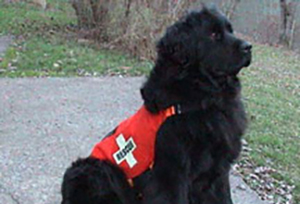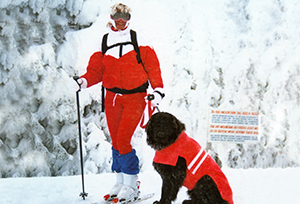by Kathy Reed
The Newfoundland is a breed that is exceptionally suited to the field of Search and Rescue. The Newfoundland dog has tremendous "sniffing" ability and also possesses the very strong instinct to want to be near humans-all humans-even ones he doesn't know. Consequently the training of the Newfoundland is really a process of building upon his instinctive desire to find people and training him to discriminate with his powerful scenting abilities so that he will focus on finding human scent.
I got started in Search and Rescue when I realized that these dogs had such great potential-after attending a presentation by Susie Foley (who ran the Black Paws Academy) way back in 1989 at the National Specialty in Denver. All of the Newfoundlands that I have trained in SAR have been special to me there is a bond which you establish when you and your dog are working as a team which is difficult to describe.
Through the years I have trained four Newfoundlands for this area of work, and I've been involved with numerous other breeds through my work with my local Search group. The Newfoundlands I have worked with have a very fine scenting capability that is to me absolutely awesome. I have noticed that they seem to be capable of scenting even the most minute particles and begin to pick up the scent farther away than some of the other breeds.
Training for SAR work begins with "puppy runaways" and progresses through a series of steps, each one longer or more difficult, until the puppy begins to understand that whenever you say that magic word "search" he will find a human being or a human scent, and that this will always be, for him, the most fun thing he will ever do! If you want to train your Newfoundland to search for humans, living or dead, to the dog it must be the most totally rewarding thing he will ever do! Obedience classes are part of the training but there must also be "outdoor/off leash" obedience. It is absolutely vital that an off leash command to "Stop! Wait!" be incorporated into the training, and such things as working out ahead of the handier a certain distance, being unafraid of obstructions such as thistle patches or muddy creek bottoms.
Social skills with other dogs are important. Training your dog to work around animals is a must-you never know when you will be in the middle of a cow pasture-sometimes in the dead of night! Exposing your dog to crowds and noises is essential, too. At one search Angel and I participated in there were nearly a 100 horseback riders and a helicopter that landed across the street. Everything you do must be aimed toward the goal of a completely unflappable dog that will focus so completely on searching that nothing will get him off track.
Training for Search and Rescue is not your typical classroom situation. Most groups in the country recognize that the training must be in varying locations, in different climatic conditions, with different hidden humans, and in all possible scenarios-this just is not conducive to a regular Friday night obedience class! It is a long process to train a search dog. Our group considers 18 months as the minimum amount of training time.
Most groups tend to structure their training for the particular locale of the country in which they live. In Iowa we are faced with persons lost in vast cornfields in summer heat and drownings. In the muddy waters of the midwestern rivers, locating a body is difficult for divers without the aid of search dogs.
Nearly all of the call-outs here in Iowa have been drownings. All of these drowning scenes are emotionally difficult but the one that will always remain with me is one where a pair of eight-year-old twins had slipped into the river. Angel and Windy went with me to the call-out. I got the call at about 9 p.m. The kids had not returned home from playing. When we arrived at the scene, Angel followed the same trail that had been followed by the first to arrive at the scene, a fellow handler with his Lab. The trail led all around the river's edge but ended at a small outcropping at the river.
On the water that night, all our dogs indicated, but the following day the indications on the surface of the water made it difficult for the handlers and the divers to determine where the actual search area should be. Both Angel and Windy made very decisive indications in one particular location, and this was indeed where the bodies were located. Bringing those children up from the river's muddy bottom required the combined efforts of the diving team, the fire department, law enforcement, our search dogs and the Red Cross.
Search and Rescue involves a commitment of time and money and emotions. It is not for everyone. The fun of training and the experience of watching how your dog uses his scenting ability is most likely going to be coupled with devastating emotional involvement at some time in the future.
In the dead of a cold February night, a dog/handler from our team actually found an old man who had wandered away from his farm home. He could have died of hypothermia by morning. When I received that call, at 2:30 a.m., that he had been FOUND, my heart sang with joy! Just this past winter, a similar scenario, in the middle of a tremendous thunder and lightning rain storm, when an older gentleman was found lying up against an electric fence, wet but alive! To me, the greatest satisfaction of being involved with Search and Rescue is the realization that in doing this work, you and your dog are helping to bring closure to a family and sometimes even, in the BEST scenario, finding a living breathing human and returning him to his loved ones!
reprinted from NewfTide 2003

